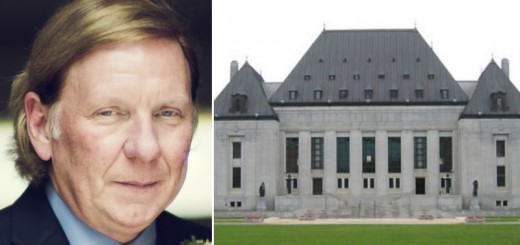R v Ellard: Seeking Justice
On 14 November 1997, fourteen-year-old Reena Virk was swarmed and beaten by a group of teenagers in Victoria, B.C., at the south end of the Craigflower Bridge. After the beating, bloodied and bruised, Virk made her way across the bridge to head home. Two of the original attackers, Warren Paul Glowatski and Kelly Marie Ellard, followed Virk to the other end of the bridge to assault her again. Ellard allegedly held Virk’s head under water for several minutes until she drowned.
Virk’s body was found eight days later. Glowatski, Ellard and six teenage girls were arrested. Three girls plead guilty to and three were convicted of assault causing bodily harm. Now known as the Shoreline Six, the girls, ages 14 to 16, received sentences ranging from sixty days conditional to one year imprisonment for their participation in the original beating. Glowatski, who was 16 at the time of the offence, was tried in adult court and convicted of second degree murder. He was sentenced to life imprisonment with eligibility to apply for parole after seven years.
At the time of the offence, Ellard was 15 years of age. Her first trial was held in adult court in March 2000. The jury convicted Ellard of second degree murder and she received a life sentence without parole for five years. In 2003, the British Columbia Court of Appeal (“BCCA”) overturned the conviction and ordered a new trial. The court found that Crown counsel’s cross-examination of Ellard, who had testified in her own defence, had been improper. Ellard had been released on bail pending her appeal since November 2001, after having served 18 months of her life sentence.
Ellard’s second trial took place in June and July of 2004. Following five days of jury deliberations, a mistrial was declared. It became known that there was one holdout juror for a not-guilty verdict; the other 11 believed that Ellard was guilty. The holdout juror was widely criticized in the media and even by Crown counsel.
The third trial opened in February of the following year. In April 2005, a jury again found Ellard guilty of second degree murder, and she was sentenced to life imprisonment without parole for seven years.
BCCA
In R v Ellard, 2008 BCCA 341, released 5 September 2008, the BCCA set aside Ellard’s conviction and ordered a new trial. Frankel J.A. found the trial judge erred firstly in finding that defence counsel in his cross-examination of a Crown witness was alleging recent fabrication, and secondly in permitting Crown counsel to conduct a re-examination to admit evidence of her prior consistent statements. In separate concurring reasons, Chiasson J.A. found that the trial judge did not err in allowing the re-examination, but instead erred by failing to instruct the jury with regard to the limited use that could be made of the evidence that was introduced on re-examination.
In dissent, Low J.A. found that the re-examination did nothing more than emphasize the weaknesses in the witness’ testimony and no harm resulted from the trial judge’s failure to provide instructions to the jury limiting the use of prior consistent statements.
Seeking Justice
The appeal hearing date for this case before the Supreme Court of Canada (“SCC”) has been tentatively set for 20 April 2009. If the Court overturns the decision of the BCCA, Ellard will serve a sentence of life imprisonment (with at least seven years before parole eligibility). However, what would be the result arising from the SCC dismissing the appeal and upholding the decision of the BCCA? If the appeal to the SCC is dismissed, should the Crown pursue a fourth trial? If a fourth trial is held, the defence is almost certain to bring an application for a stay of proceedings likely on the grounds of abuse of process and s. 11(b) of the Charter.
According to R v Jewitt, [1985] 2 SCR 128, a stay to remedy an abuse of process should be granted only in the “clearest of cases” where “compelling an accused to stand trial would violate those fundamental principles of justice which underlie the community’s sense of fair play and decency” or where the proceedings are “oppressive or vexatious” (para 25).
The Court in R v Keyowski, [1988] 1 SCR 657 [Keyowski], held that making the accused stand for a third trial does not constitute abuse of process nor violate s. 7 of the Charter: “A third trial may, indeed, stretch the limits of the community’s sense of fair play but does not of itself exceed them” (para 4). If a third trial stretches the limits, what about a fourth trial? Wilson J. appears to indicate that while a third trial is acceptable, to go much beyond that number may render the process oppressive:
To define ‘oppressive’ as requiring misconduct or an improper motive would, in my view, unduly restrict the operation of the doctrine. In this case, for example, where there is no suggestion of misconduct, such a definition would prevent any limit being placed on the number of trials that could take place. Prosecutorial misconduct and improper motivation are but two of many factors to be taken into account when a court is called upon to consider whether or not in a particular case the Crown’s exercise of its discretion to re-lay the indictment amounts to an abuse of process (Keyowski, para 3).
An application under s. 11(b) of the Charter is more likely to be successful. A fourth trial, if held, would take place more than twelve years after the date of Virk’s murder. Considering the simple passage of time, the extensive coverage of the three trials in the media, and even the fact that it would be the fourth time for witnesses to testify in court, there would be a presumption of prejudice to the accused. After so many years and so many repetitions, it is questionable how much of their testimony would be untainted by time and outside influence. Also, it would be difficult to select a fair and impartial jury that would be able to judge Ellard based solely on the evidence led in court, especially after the severe criticism of the “rogue juror” who was perceived as the cause of the mistrial.
Yet, it would be difficult for the Crown to not proceed with another retrial. If the witnesses are telling the truth, then Ellard played “the crucial role in the final murder.” Glowatski served eight years in prison before he was granted day parole in June 2007; Ellard would be escaping with having served merely eighteen months in custody after her first conviction.
But has she served only eighteen months? The Court has recognized that an unresolved criminal charge imposes a heavy burden on the accused. As Justice L’Heureux-Dube remarked in R v Conway, [1989] 1 SCR 1659, the right to be tried within a reasonable time under s. 11(b) of the Charter “recognizes that, with the passage of time, subjection to a criminal trial gives rise to restrictions on liberty, inconveniences and pressures detrimental to the mental and physical health of the individual.” It could be argued then that Ellard has served a sentence as long as Glowatski.
Conclusion
During her testimony in the second trial, Ellard said, “I’m obviously going to be convicted. You’ve got what you want, my life is ruined.” No punishment could be enough for taking a young girl’s life, but Ellard’s life – at least the past eleven years and likely well into her future – has been “ruined,” and in this way, she has served her sentence. Even if a fourth trial is held and she is found guilty, imprisonment would no longer be appropriate – the focus should now be on her rehabilitation and reintegration into society. If there is to be justice, this would be it.







Join the conversation